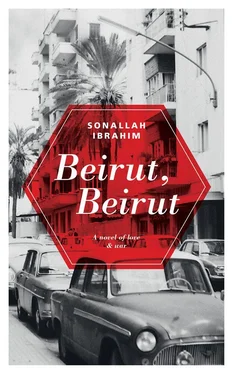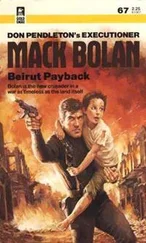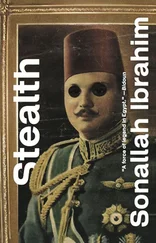“I finally found the notebook,” I said.
Without taking his eyes off the television, Wadia responded, “Didn’t I tell you it wasn’t lost? Where did you find it?”
“In the suitcase,” I said. “But I’m certain I left it on the bedside table this morning.”
“ ‘Glory to Him who is not forgetful,’ ” he said, with a hint of sharpness.
He turned off the television and we left the house. We took a taxi to a side street off the Mazraa Corniche. We got out of the car in front of a demolished building, and entered a modern building next to it, with wide balconies and plants for decoration.
“Would you like to go up Mount Lebanon tomorrow?” he asked me, as we walked up the steps. “I’ll be leaving early with a Canadian reporter. Maybe I can ask her to bring along a girlfriend of hers.”
I thought for a moment, then replied: “I don’t think I can. I have to work.”
“Tomorrow’s Sunday,” he said.
“I know. I’ll be working at your place.”
Nazar Baalbaki welcomed us with ceremonious dignity. He led us to an elegantly furnished living room, one side of which was occupied by a long table made of heavy wood, groaning with bottles and plates of grilled meat and mezze. Around the table were several men engrossed in a noisy discussion.
I sat down next to an Iraqi fiction writer who worked at a Beirut publishing house. I knew two other people around the table, one of whom was a Syrian film director, whose film about raising rabbits had been banned from screens by the Baathists. The other was a Palestinian scholar who was studying at Cairo University for his PhD.
Nazar put a small empty glass in front of me and another in front of Wadia. He poured them half-full of arak, then added the same amount of water and a piece of ice. I downed the glass in one shot.
It became clear that the discussion concerned the stance of the Lebanese Communists in the civil war. There was a large man with a thick mustache called Marwan, who was accusing them of treachery because they had squandered their chance to seize power.
He was speaking with an unusual amount of vehemence and stridency, and was using phrases like “right-wing opportunism” and “betraying the cause”. A Lebanese writer argued against him with the same force, emphasizing that someone wouldn’t allow them to act, starting from the factions within the Lebanese leftist front itself, all the way to Israel.
I noticed that Nazar was listening with interest without joining in the discussion. Marwan shifted his attack to a new area, saying: “How do you explain the fact that they aren’t lifting a finger to defend leftists who have been arrested in Syria?”
The Lebanese wasn’t able to respond, since at that moment we were joined by the artist with the petition who I had met with Antoinette. With him was a young man with long sideburns and rough lips who greeted me warmly. He was on the point of kissing me on the mouth, and would have, if I hadn’t turned my face at the last moment. A shudder went through my body as I watched him kiss people around the table on the mouth.
I directed my attention to a large serving-plate of grilled jumbo shrimp. I filled my dish with some as I tried to remember if I had ever eaten shrimp this size in my life.
I drank another glass of arak, and began wholeheartedly stuffing myself with the fresh white meat. Then I lit a cigarette. Wadia noticed I was looking for an ashtray; he put his glass on a small table next to him, picked up an ashtray from it, and handed it to me.
Nazar suddenly stood up in a state of agitation; he produced a napkin and hurried to the small table. He lifted the glass from it and dried its surface very thoroughly.
Wadia was upset and put out his hand to take his glass from Nazar while mumbling apologies. I looked carefully at the table’s surface which I supposed was everyday formica.
Suddenly, Marwan addressed me: “Did you hear what Sadat said yesterday to a female reporter from the Jerusalem Post ?”
I shook my head. Wadia leaned over and said, “I read about it. He mentioned that he was about to make an important political decision.”
“He described the decision as being a historical step,” Marwan added. “I wonder what he means.”
“The only thing left is joining NATO or signing a joint defense agreement with Israel,” I said.
One of the people around the table mentioned the name of Ziad al-Rahbani and the conversation turned to his new play called An American Feature Film . I asked Nazar what the name meant and he explained that it was taken from television programs, where the late-night feature film is usually described that way.
“Ziad is completely finished,” Marwan added, in his cutting, peremptory manner. “He’s had nothing new to say ever since the heavy fighting ended.”
“He was with the left at the time,” Wadia explained to me.
“And now?” I asked.
“No one knows where he stands,” he replied.
I filled my glass as I looked at the guests around the table. I asked myself how much of what Wadia just said applied to each one of them.
The amount I had to drink didn’t give me what I considered to be a deep, uninterrupted slumber. I heard Wadia leaving the house early in the morning, but afterwards, I couldn’t get back to sleep.
I finally got out of bed, feeling sluggish. I washed my face and had breakfast. I made myself a big cup of coffee. Then I sat down to go over the scenes I had recorded from the film. A little before noon, the phone rang.
I picked up the receiver and heard Lamia’s voice.
“How are you? Did I wake you up?”
“Not at all,” I replied.
“What are you doing today? Will one of Beirut’s ladies be keeping you busy?”
“The only Beirut lady I know is you.”
She laughed.
“Did you read the book?” I asked her.
“I read a large part of it. But we can talk about that later. What would you say if I were to invite you to lunch?”
“I’d be honored,” I said.
“I’ll stop by to see you an hour from now.”
“But without an escort,” I added.
She laughed. “I’ll try,” she said. “In any case, today is everyone’s day off.”
I described for her where the house was, and hung up. I lit a cigarette and looked for the bottle of French cognac that Wadia had bought two days previously. I poured a glass of it and sniffed it with pleasure. I took a sip and held it in my mouth for a moment before swallowing.
I went to the bathroom, looked at my face in the mirror, and felt my chin. I shaved, but the reflection that looked back at me hadn’t improved much. After taking a quick shower, I felt invigorated. The sky was thick with clouds and there was a cold bite in the air, so I put on all my clothes and sat down, drinking my glass of cognac in the living room.
My glass was empty so I poured myself another. No sooner had I finished it than the sound of a zumur — as the Lebanese call a car horn — came up to me from the street. I heard it again, so I hurried to the balcony. I saw her head sticking out of the driver’s window in a white two-seater car. I waved down to her and hurried inside, after locking the door to the balcony. I took a swig straight from the cognac bottle, then went down to the street.
She opened the car door for me, and her perfume wafted lightly over me, surrounding me as I settled in beside her. She was wearing white pants and a silk blouse of the same color. Over her shoulders she had a pink wool vest. Her hair was gathered to the side in a single bunch that rested on her chest. Around her neck was a thick pearl necklace.
The car headed toward Raouché. Cold air came at me through the window, so I felt around for the handle to roll it up, but she stopped me, saying: “Don’t trouble yourself with that.”
Читать дальше












